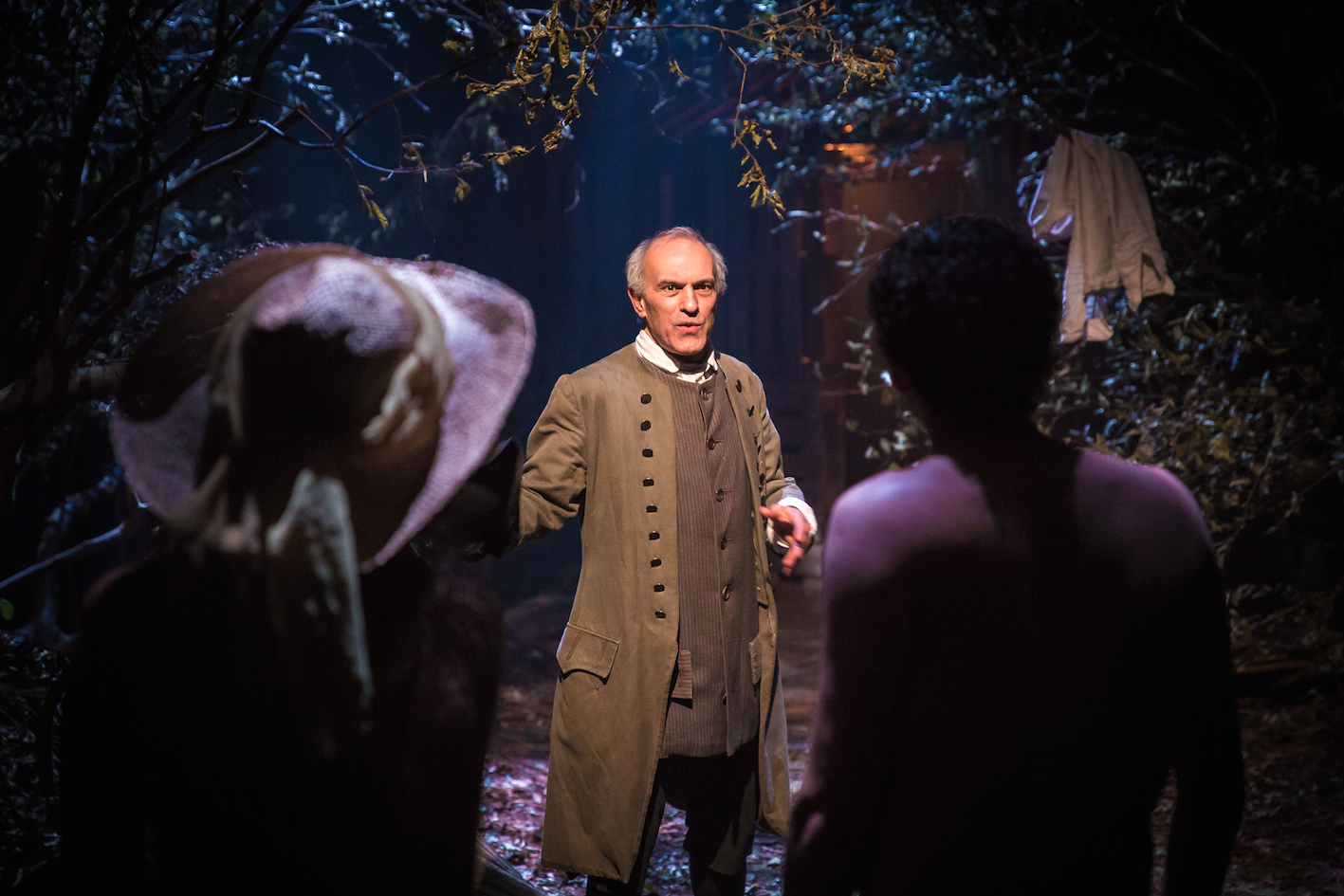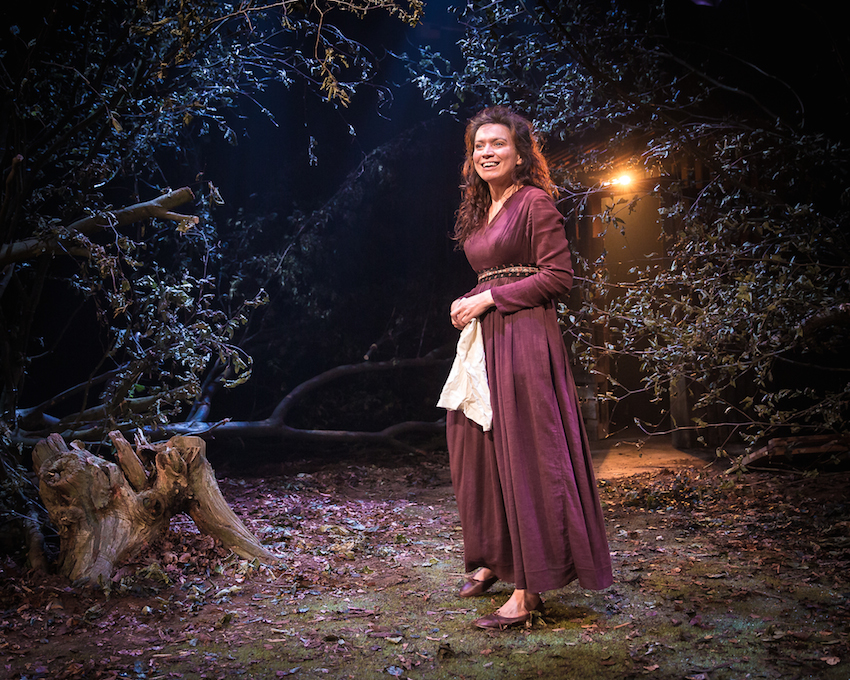In Lambeth, Southwark Playhouse | reviews, news & interviews
In Lambeth, Southwark Playhouse
In Lambeth, Southwark Playhouse
A delightful dramatisation of a meeting between William Blake and Thomas Paine

When the lights go up on Jack Shepherd’s In Lambeth, you could be forgiven for assuming you were looking at a biblical scene. A man and a woman sit naked in the branches of a tree, a tableau straight out of Eden, not south London. She has a book in her lap; he’s picking out a tune on a tin whistle. All is serene.
Except this isn’t Eden, and they are not Adam and Eve. This is London in the late eighteenth century, and William and Catherine Blake are reading Milton’s Paradise Lost while sitting in a tree in their Lambeth garden. William is talking to the angel who taught him the tune he is playing on his whistle. Shortly after, their little patch of paradise is disturbed by the arrival of a visitor - fully clothed in the long coat and tricorn hat more usually associated with the period - who stumbles in off the road seemingly by accident. This is Thomas Paine: writer, rabble-rouser, revolutionary. Recently returned from France, Paine (played by Christopher Hunter, pictured right) has just published Rights of Man, a defence of the French Revolution, and is - as Catherine puts it - “a marked man” on the streets of London for his well-known Republican feelings. Without asking any questions about why he is there, the Blakes immediately offer him hospitality, Catherine stretching their dinner of rabbit pie to include him, and William dashing off to spend their last few coppers on wine. Once William works out who their guest is, they also put their clothes back on.
This is Thomas Paine: writer, rabble-rouser, revolutionary. Recently returned from France, Paine (played by Christopher Hunter, pictured right) has just published Rights of Man, a defence of the French Revolution, and is - as Catherine puts it - “a marked man” on the streets of London for his well-known Republican feelings. Without asking any questions about why he is there, the Blakes immediately offer him hospitality, Catherine stretching their dinner of rabbit pie to include him, and William dashing off to spend their last few coppers on wine. Once William works out who their guest is, they also put their clothes back on.
What follows is an intense exchange about the nature of revolution and justice. Sitting around the table in the Blakes’ overgrown garden, Paine articulates his belief that political change must be practical - he wants to end child labour, create better political representation, bring about universal literacy. Blake counters him with wild, metaphysical visions that express his concerns that revolution is merely the turning of a wheel that replaces one kind of tyranny with another. If, as Blake puts it, “opposition is true friendship”, then Blake and Paine are the closest of comrades. All the while, Catherine hovers between the two, providing food and drink, always on the edge of interjecting her own opinion, but never quite managing it.
These great men can't spot the injustice at their own dinner tableJack Shepherd is better known as an actor - on stage in the original cast of Mamet’s Glengarry Glen Ross, and on screen in TV detective drama Wycliffe. First performed in 1989, In Lambeth is just one of several plays he has written portraying significant points in history: he has also dramatised the Cromwellian revolution, and the Chartists’ struggle. After its initial performance, several critics termed this play “charming”, and this production demonstrates why: it’s attractive, to be sure, but it’s also compelling and persuasive. It manipulates your point of view.
In this revival, it is Ruth Sutcliffe’s design that makes the Blakes’ home seem wild and wonderful - the tangle of trees she has created had the audience oohing with delight as they entered the theatre. Tom Mothersdale is impressive as Blake, as earnest when he is swearing from the branches of his tree as when he is disputing politics with Paine. The latter, played by Christopher Hunter, has a slightly jarring American twang at times, but his uncompromising brusqueness is an excellent foil to Blake’s wilder flights of fancy.  The standout performance of the evening, though, comes from Melody Grove as Catherine Blake (pictured right). Caught between the two great men, she has comparatively few lines, yet is the lynchpin of the whole piece. She serves as a constant reminder that for all their talk of equality, these political radicals aren’t perfect - they never bother to include her, a woman, in their discussion.
The standout performance of the evening, though, comes from Melody Grove as Catherine Blake (pictured right). Caught between the two great men, she has comparatively few lines, yet is the lynchpin of the whole piece. She serves as a constant reminder that for all their talk of equality, these political radicals aren’t perfect - they never bother to include her, a woman, in their discussion.
Blake admits ruefully that although he embarked on his marriage with the intention of equal partnership, he has slipped back, meaning that most of the “drudgery” falls to her. In real life, Catherine Blake was held up as an example of an “ideal wife”, devoting her entire life to caring for her husband and assisting with his work. As Grove’s superbly contained performance here demonstrates, even history’s greatest revolutionaries couldn't spot the injustice that was sitting at their own dinner table.
rating
Explore topics
Share this article
The future of Arts Journalism
You can stop theartsdesk.com closing!
We urgently need financing to survive. Our fundraising drive has thus far raised £49,000 but we need to reach £100,000 or we will be forced to close. Please contribute here: https://gofund.me/c3f6033d
And if you can forward this information to anyone who might assist, we’d be grateful.

Subscribe to theartsdesk.com
Thank you for continuing to read our work on theartsdesk.com. For unlimited access to every article in its entirety, including our archive of more than 15,000 pieces, we're asking for £5 per month or £40 per year. We feel it's a very good deal, and hope you do too.
To take a subscription now simply click here.
And if you're looking for that extra gift for a friend or family member, why not treat them to a theartsdesk.com gift subscription?
more Theatre
 The Weir, Harold Pinter Theatre review - evasive fantasy, bleak truth and possible community
Three outstanding performances in Conor McPherson’s atmospheric five-hander
The Weir, Harold Pinter Theatre review - evasive fantasy, bleak truth and possible community
Three outstanding performances in Conor McPherson’s atmospheric five-hander
 Dracula, Lyric Hammersmith review - hit-and-miss recasting of the familiar story as feminist diatribe
Morgan Lloyd Malcolm's version puts Mina Harkness centre-stage
Dracula, Lyric Hammersmith review - hit-and-miss recasting of the familiar story as feminist diatribe
Morgan Lloyd Malcolm's version puts Mina Harkness centre-stage
 Reunion, Kiln Theatre review - a stormy night in every sense
Beautifully acted, but desperately grim drama
Reunion, Kiln Theatre review - a stormy night in every sense
Beautifully acted, but desperately grim drama
 The Code, Southwark Playhouse Elephant review - superbly cast, resonant play about the price of fame in Hollywood
Tracie Bennett is outstanding as a ribald, riotous Tallulah Bankhead
The Code, Southwark Playhouse Elephant review - superbly cast, resonant play about the price of fame in Hollywood
Tracie Bennett is outstanding as a ribald, riotous Tallulah Bankhead
 The Lady from the Sea, Bridge Theatre review - flashes of brilliance
Simon Stone refashions Ibsen in his own high-octane image
The Lady from the Sea, Bridge Theatre review - flashes of brilliance
Simon Stone refashions Ibsen in his own high-octane image
 Romans: A Novel, Almeida Theatre review - a uniquely extraordinary work
Alice Birch’s wildly epic family drama is both mind-blowing and exasperating
Romans: A Novel, Almeida Theatre review - a uniquely extraordinary work
Alice Birch’s wildly epic family drama is both mind-blowing and exasperating
 The Producers, Garrick Theatre review - Ve haf vays of making you laugh
You probably know what's coming, but it's such great fun!
The Producers, Garrick Theatre review - Ve haf vays of making you laugh
You probably know what's coming, but it's such great fun!
 Not Your Superwoman, Bush Theatre review - powerful tribute to the plight and perseverance of Black women
Golda Rosheuvel and Letitia Wright excel in a super new play
Not Your Superwoman, Bush Theatre review - powerful tribute to the plight and perseverance of Black women
Golda Rosheuvel and Letitia Wright excel in a super new play
 Cow | Deer, Royal Court review - paradox-rich account of non-human life
Experimental work about nature led by Katie Mitchell is both extraordinary and banal
Cow | Deer, Royal Court review - paradox-rich account of non-human life
Experimental work about nature led by Katie Mitchell is both extraordinary and banal
 Deaf Republic, Royal Court review - beautiful images, shame about the words
Staging of Ukrainian-American Ilya Kaminsky’s anti-war poems is too meta-theatrical
Deaf Republic, Royal Court review - beautiful images, shame about the words
Staging of Ukrainian-American Ilya Kaminsky’s anti-war poems is too meta-theatrical
 Laura Benanti: Nobody Cares, Underbelly Boulevard Soho review - Tony winner makes charming, cheeky London debut
Broadway's acclaimed Cinderella, Louise, and Amalia reaches Soho for a welcome one-night stand
Laura Benanti: Nobody Cares, Underbelly Boulevard Soho review - Tony winner makes charming, cheeky London debut
Broadway's acclaimed Cinderella, Louise, and Amalia reaches Soho for a welcome one-night stand
 The Pitchfork Disney, King's Head Theatre review - blazing with dark energy
Thrilling revival of Philip Ridley’s cult classic confirms its legendary status
The Pitchfork Disney, King's Head Theatre review - blazing with dark energy
Thrilling revival of Philip Ridley’s cult classic confirms its legendary status

Add comment